All the Answers
Well-known member
The “extortion” organization chart of the Polo Obrero investigated by Justice: the roles of each of the accused - Infobae

Source:

El organigrama “extorsivo” del Polo Obrero que investiga la Justicia: los roles de cada uno de los imputados
Los referentes de la organización piquetera son los principales apuntados por el fiscal Gerardo Pollicita. “Que paren un poco, porque se están llevando un plan, se están llevando comida, ¿y encima les tenemos que dar más cosas?”, la confesión de un dirigente a cargo de uno de los comedores
May 17, 2024
The representatives of the piquetera organization are the main ones pointed out by prosecutor Gerardo Pollicita. “Let them stop a little, because they are taking a plan, they are taking food, and on top of that we have to give them more things?”, the confession of a leader in charge of one of the dining rooms.
By Andres Klipphan
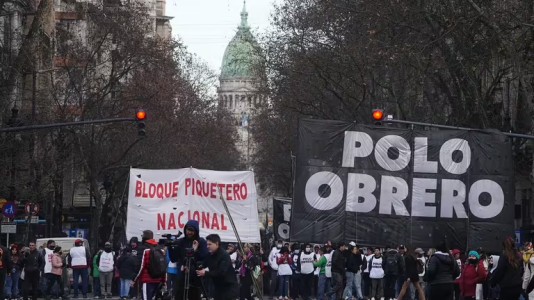
The strong complaint about the cause of extortion that points against the Polo Obrero (Franco fafasuli)
Justice continues to advance the case for the alleged cases of extortion carried out by a group of picketers on the beneficiaries of social plans such as Potenciar Trabajo. They study the documentation that they seized in the raids. The cause is revealing. There are conversations between the social leaders of the Polo Obrero who say they fight for those who have the least to outrage . “Let them stop a little, because they are taking a plan, they are taking food , they are going to the dining room, and on top of that we have to give them more things? If they want to come, let them come and if not, let them all go sh*t, period . ” The conversation was between Gustavo Vásquez , a representative of a dining room, and the delegate Cinthya Delgado.
Federal prosecutor Gerardo Pollicita uses very strong terms about the 28 defendants, the majority, 17 of them, belong to the Polo Obrero . He describes acts of practically subjugating the victims.
In the request for arrest and searches that he made to Judge Sebastián Casanello , he describes a system of “punishments” on the beneficiaries of social plans who did not attend the marches and protests organized by the Piquetera Unit. In the letter, the federal prosecutor details the roles of the members of the “Polo Obrero Civil Association” and the “administration” of three community kitchens whose responsible parties were reported to line 134 enabled for this purpose by the Ministry of National Security. , by Patricia Bullrich.
“Stretches”, “extortions”, “sanctions”, “fines” and “capita collection” are recognized. They are the Rivadavia I, La Carbonilla and Mariano Ferreyra soup kitchens .

Did the maneuvers only occur in those places or a systematic plan? The prosecutor suspects that these are widespread operations. The presumption is based on the fact that the same methods are repeated in the three organizations under investigation: the Polo Obrero , the Front of Organizations in Struggle (FOL) and Barrios de Pie. The first two make up the Piquetera Unit, the third the Popular Economy Workers Union (UTEP), where most of the Peronist social movements are based. Pollicita and Casanello will have to prove it, and that's what they are doing.
Organizational chart of the Workers' Pole
Like someone putting together a three-thousand-piece puzzle, Pollicita put together the pieces she already has.
Based on wiretaps and transcriptions of voice messages and WhatsApp groups that brought together the leaders who managed the Polo Obrero community kitchens, he managed to reconstruct the organization chart of that social movement - see infographic -.
Eduardo Belliboni , the leader of the organization, is not mentioned in this section of the investigation.
Another leader of the Polo Obrero, and supporter of Belliboni, does appear in a leading role, Jeremías Cantero , former candidate for national deputy for the City of Buenos Aires in the last elections for the Left Front of Unity Workers, and an official in the former Social Development portfolio between 2020 and April 2024.
The prosecutor maintains that Cantero occupied the “higher echelon than the leaders of each dining room. "He intervened in the decision-making regarding coercive and extortionate demands on the victims."
From the communications collected by Pollicita it emerges that both Cantero and Elizabeth Del Carmen Palma , another leader of the Polo Obrero, “would intervene in the decisions about the destination of the proceeds of crime, as can be seen from a telephone conversation on March 27, 2024 held Between both".
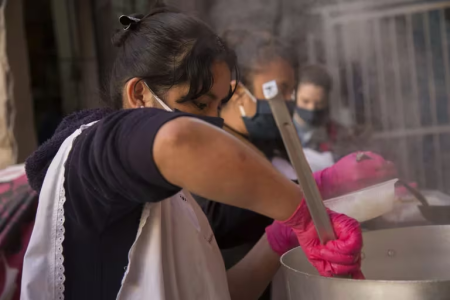
Justice investigates the alleged extortion of beneficiaries of plans in several community kitchens in the Polo Obrero, the FOL and Barrios de Pie
That day, Palma “expressed to Cantero his concern regarding the possibility of being investigated 'for money laundering' in relation to the 'cooperatives that the capitals are receiving.'” Given this concern, the piquetero leader “proposed to think of a plan for where this is going ,” in reference to money.
For the prosecutor, these dialogues "suggest that the activities of the accused were also aimed at channeling illicit funds from extortion through cooperatives, with the final destination of that money being unknown to date."
Below Cantero, there are five other leaders, the aforementioned Elizabeth Del Carmen Palma, Gianna Puppo, Maria Isolda Dotti, Ivan Ezequiel Candotti And Gustavo Guillermo Vasquez
All of them “ fulfilled the functions of leading and coordinating the actions of their members. They uploaded the data so that the victims could receive or stop receiving the social plan.”
The prosecutor has already incorporated into the proceedings printed forms with attendance or non-attendance at the marches. They correspond to the Rivadavia I dining room. In green and with the capital letter “P” , it indicates that the beneficiary was present. The blank box is synonymous with absence. The same control was carried out on people who were on the “waiting list” to access the Enhance Work. They were told that the greater the number of “P”, the greater the chance of accessing the plan.
According to the court case, Elizabeth Del Carmen Palma “would also have intervention in the conduct related to decision-making regarding the proceeds of crime, from her position as Principal Trustee and later member of the Board of Directors of the El Resplandor Limitada Work Cooperative, position that continues to play.
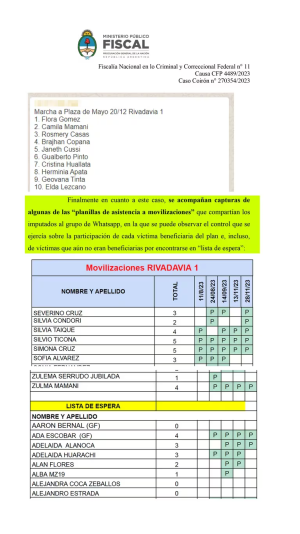
The forms in which the leaders of the Polo Obrero recorded those present and absent in the marches
From that position of power, the prosecutor describes that the accused leaders of the Polo Obrero “ appropriated a portion of the public funds allocated by the National State to said assistance and, at the same time, coerced the beneficiaries , in order to force them to participate in mobilizations called by the Polo Obrero.”
With these objectives, “the defendants let the neighbors and potential soup kitchen attendees know that, to become beneficiaries of the Potenciar Trabajo Plan, they had to attend a certain number of marches or mobilizations of the Polo Obrero, which increased their chances of entering a 'waiting list' from which, later, they could be registered as beneficiaries of said plan, which they called promotion."
Once the Potenciar Trabajo was accessed, whose 20-hour weekly work was carried out in cooperatives or canteens of the left-wing organization, the delegates of each canteen let the beneficiary know that, in order to continue collecting the benefit, they had to attend the protests. “Otherwise, you would be disenrolled from the plan.”
Below that group, the organization chart prepared by Pollicita locates the “delegates” of each dining room.
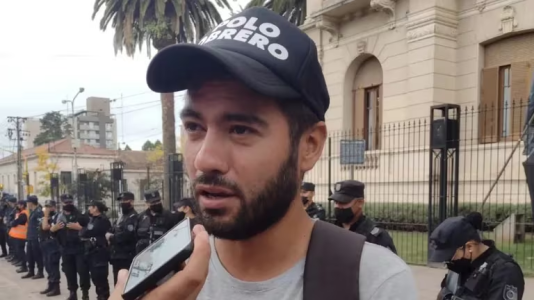
Prosecutor Gerardo Pollicita assigns a relevant role to Jeremías Cantero, one of the main leaders of the Polo Obrero led by Eduardo Belliboni.
In the words of the prosecution, and according to the accumulated testimonies, they were in charge of “ transmitting the coercive demands, taking attendance lists and demanding and collecting money from the victims.”
The identified persons are eleven: Dina Patricia Iramain, Brisa Noelia Paucara Choque, Ronald Vargas Rocabado, Elizabeth Galindo Mamani, Cinthya Delgado Vilches, Lesli Salirrosas Castillo, Damariz Erika Villafuerte, Blanca Beatriz Chuquimia Tarquino, Gloria Jaramillo Morales, Lucca Philippe Quispe Rashuaman and Yoao Ariel Escobar Reds.
Among their tasks was to “require victims that, if they did not attend a mobilization, they must justify their absence and accompany the corresponding records of the reasons that prevented participation—such as the existence of medical appointments; because otherwise it would be noted as an absence ; which could cause the imposition of 'sanctions' , which ranged from not receiving merchandise from the cafeteria for a certain period of time, to being demoted in category or being discharged from the Potenciar Trabajo.”
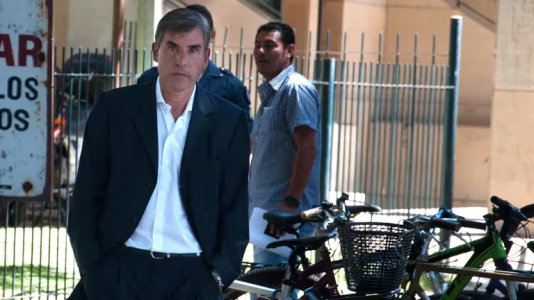
Prosecutor Gerardo Pollicita investigates an alleged criminal network in social organizations and picketers Adrián Escandar 162
Pollicita says: “From the members of all categories , in the three soup kitchens, the defendants demanded, in addition to attending the marches and mobilizations, the payment of monthly 'capitas' equivalent to 2% of the social assistance received in each case; which was always paid in cash , the first days of the month; and, in case of non-compliance, they were included in the list of defaulters which, depending on the delay and the criteria of the accused, could lead to the decision to demote the debtor in category until even ordering the withdrawal of the Potenciar Trabajo Plan. , so I was put on the waiting list again.”
Among the dozens of communications that are included in the file, one clearly reflects that some of the leaders who say they “fight,” “fight,” “defend the rights of the poor,” of the “most humble,” reflect that a One thing is what is said in public and another thing between the four walls and the privacy of the telephone line. It was the dining room's representative, Gustavo Vásquez , who complained to delegate Cinthya Delgado "because the beneficiaries want to access the food that the dining room distributes." His actual words were: “Let them stop a little, because they are taking a plan, they are taking food , they are going to the dining room, and on top of that we have to give them more things? If they want to come, let them come and if not, let them all go sh*t, period.” The dialogue between the leaders of the Polo Obrero took place on March 14, 2024, the case was already being processed and they were being listened to.

